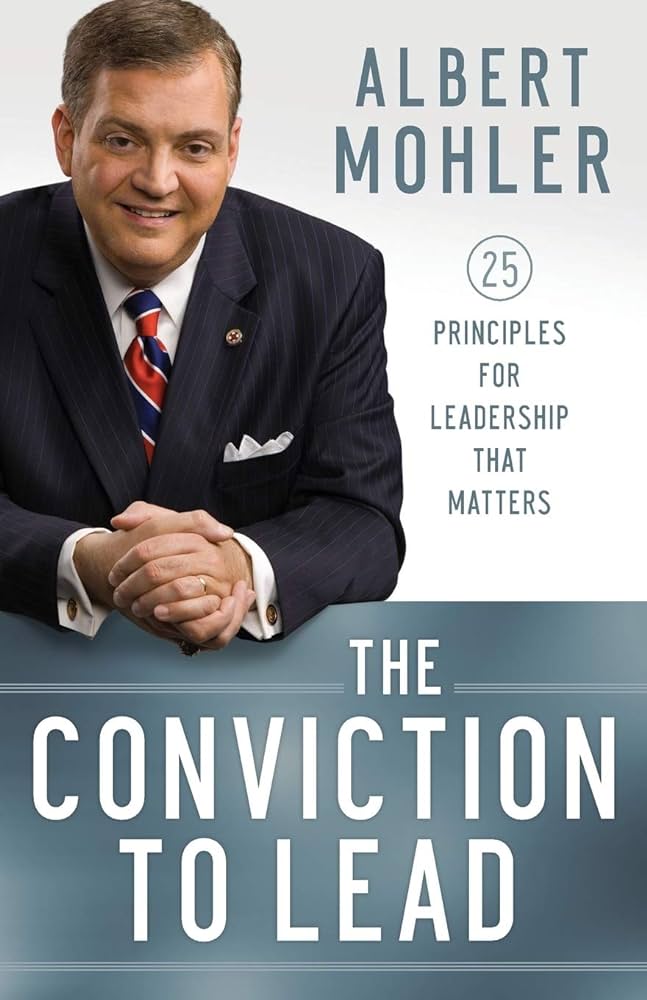Peruse Bible teachings and church happenings
wisdom
Faithful Reading: The Conviction To Lead
Sunday, January 21, 2024
One thing that Christians sometimes neglect to include in their efforts toward spiritual growth is the reading of faithful books. Obviously, the works of uninspired men are not of the same caliber as the inspired word of God when it comes to guiding our spiritual growth. But, just as we listen weekly to godly teachers & preachers who offer their insights into the word of God, there have been many authors down through the centuries who have faithfully expounded the Scriptures’ meaning in some really helpful ways. So, on Sundays in January, these articles will recommend spiritual books that can help us more clearly see God’s plan and our place within it.
-----------------------------------------
The Conviction to Lead, by Albert Mohler, gives 25 principles for leading a group of people with Biblical principles, starting with a simple and powerful truth: those who lead must have some strong convictions about Christ, the Bible, and God’s purposes in the world. As the author says, much leadership talk is about plans, but convicted leadership is about a purpose—a belief in an ideal—that is the guiding light for one’s life and influence on others. As the author says, “The leader is rightly concerned with everything from strategy and vision to team-building, motivation, and delegation, but at the center of the true leader’s heart and mind you will find convictions that drive and determine everything else.” The apostle Paul encouraged the Christians in Thessalonica to know the Gospel in the same way that he himself did: “not only in word, but also in power and in the Holy Spirit and with full conviction” (1 Ths. 1:5).
From that starting point, the author expounds many key principles of leadership, both practical and conceptual. Leadership is all about character; a principle seen in the two main passages about elders’ qualifications. Leaders are managers; a principle seen in the Bible’s repeated admonitions to care for one’s flocks and household. Leadership is stewardship; a principle seen in Jesus’ passing of his kingdom into the hands of men until his return. All of these ideas, plus many very practical pieces of advice throughout the book, have greatly helped me as a leader in both religious and secular work settings.
Spiritual principles and scripture quotes are found throughout the book, guiding readers to think about leadership like the Lord himself would. So , whether you’re a leader in your workplace, here at church, in our community, or in the military; some of these principles (and maybe all of them, to some degree) will be helpful guidance for you. The presence of godly leaders in the world is a blessing from God, and so if more of God’s people can become the leaders that we should be, we can more fully become a channel of his blessings to the world.
-Dan Lankford, minister
Me & The Screen | Disconnected and Distracted?
Wednesday, January 10, 2024
How much time do you spend with a screen? Stats on Americans’ average usage are bandied about sometimes. But this consideration isn’t about an epidemic pattern in a group; It’s about YOU. How much of your time is spent with the screen, and which apps are getting the most of that screentime? Your phone’s Settings menu can answer these questions, and it might be worth finding out.
I find that the stats often show a different picture of my life than what I feel. I may feel that I spend a lot of time on good things throughout each day, but then the numbers tell a different story. Chances are that a lot of us are wasting some time with our devices. There are undoubtedly some productive, wholesome, and meaningful things that we do with them; but if we are being wasteful, then we should correct it.
Because wasting too much time on mindless frivolity can’t be a hallmark of a life given to Jesus. Paul warned us to “make good use of the time, because the days are evil” (Eph. 5:19). And Jesus gave us his example of one who worked on the things of God while the time was right, because he was aware of the preciousness of time and the importance of using it wisely (cf. John 9:4).
Additionally, there’s the whole consideration of whether our device-centric activities get more attention than our relationships. Are we engaged in the lives of our spouses, kids, parents, friends, and others? Or are we checked out, giving our attention and care to a screen?
It might be wise for all of us to check our screentime stats for a clearer understanding of what we’re actually engaged with. Maybe we’ll find that we’re using our time exactly as we believe we should; maybe not. In either case, let’s be aware so that we can make wise choices that glorify God.
And more than that, it might be wise to just occasionally put the phone away and fully engage the people and the moment in front of you. Just exercise the mental muscles of attentiveness, care, and awe. Exercise those often enough, and we’ll find that their strength is a lot more rewarding than the mental weakness that we begin to breed when we are in a constant state of distraction and entertainment from a screen.
- Dan Lankford, minister
(images sourced from Storyset.com)
Me & The Screen – Your Phone's Not Inherently Bad
Saturday, January 06, 2024
Smartphones are ubiquitous now. Everyone, everywhere, seems to recognize one when they see it. Many of us have more than one. They are such a transformative piece of tech that little kids hold up their hands to pretend to talk on the phone differently than they used to (most kids now don’t do the thumb-and-pinky thing because they have no context for phones that look like that). They are around us all the time, which, as most of us realize, can be both a good thing and a bad thing.
This month, I want to talk about Christians and smartphones, and I’d like to start the series by noting some good that can come from wise usage of our devices.
They give us opportunities to authentically share God’s word thru apps like Zoom and FaceTime. They give us a view of our world’s events and people’s many needs. Countless websites provide various forms of truthful, high-quality Bible teaching. Bible reading apps abound. You can stay connected with friends and family in authentic ways through social media outlets (several of them can still be used for that).
I, for one, really like having a smartphone in my life. It helps me be better connected with others, more attentive to the world and my role in it, and more productive as a Christian leader. Of course, it’s not an unqualified good. But in the main, I find that it helps me become more of the kind of person that God would have me be.
A smartphone is like the magic mirror on the wall—it shows us what we want to see. So let’s want the things that are worthwhile to Christian eyes, ears, and hearts. Christ said, “Your eye is the lamp of your body. When your eye is healthy, your whole body is full of light, but when it is bad, your body is full of darkness.” (Luke 11:34)
Preachers and parents have warned for a long time about the potential that media has to influence us for the negative. But, we can use the same technology to let our lights shine out with the ability to influence others’ minds for the positive. Let the lamp of the body shed light on some good things, and let’s use what’s in our hands to fill our own hearts with knowledge, appreciation, and love of God.
- Dan Lankford, minister
(Images sourced from storyset.com)
Lean Into the Hard Truth
Sunday, December 17, 2023Playwrights of ancient Greece wrote tragedies and considered them a high art form. Shakespeare did the same. Some of the greatest novels of all time have been gritty forays into the saddest parts of human existence. And while tragedies do not often turn out to be box office superhits, filmmakers today still take an occasional stab at the genre.
Even if these types of stories do not appeal to everyone, why is it that they appeal to anyone? Why are any of us drawn to these dark tales of woe, loss, misery, and sadness?
I think it’s because leaning into the hard realities makes us long for something better.
And that’s the appeal that God makes all the way through the Bible. The accounts of Cain & Abel, Jacob & Esau, Moses & Aaron, Naomi & Ruth, Saul & David, and Ezra & Nehemiah… all show the depth of human weakness and sinfulness, and they all make us long for something better. The Bible writers don’t gloss over or whitewash the misery that sin brings. They are open about death and sorrow. They make us face it, and they encourage us to just sit with that reality, letting it work in our hearts to make us long for someone to repair all of sin’s damage.*
In fact, the Old Testament would be considered a tragedy were it not for its being fulfilled in the New Testament. The long narrative of Israel leaves us with an unrequited desire for God to restore his people to himself. And then that desire is fulfilled in Jesus. But we are only able to fully appreciate his goodness when we have also appreciated the true sadness that comes into this life when we are separated from God.
So let’s lean into the hard truth of sin’s tragedy. And let it drive us to appreciate the greatness and splendor of God’s grace that he’s given us in our Lord Jesus Christ.
- Dan Lankford, minister
*re: repairing all of sin's damage: Isaac Watts understood this when he penned Joy to the World. Consider this stanza: "No more let sins and sorrows grow, Nor thorns infest the ground; He comes to make His blessings flow, Far as the curse is found."
Old Men and Ecclesiastes
Wednesday, December 13, 2023Three obituaries for old men have caught my attention lately. The first was Frank Borman: part of the Apollo 8 team—the first group of humans to ever orbit the moon and see the earth from the vantage point of space. He died in early November at the age of 95. The second was Norman Lear: a TV producer and major influence in the entertainment industry—responsible for the creation of “All In the Family” and other shows, and a moral revolutionary who deliberately pushed American culture in a decidedly liberal direction for a long time. He died last Tuesday at the age of 101. The third was Paul Earnhart: a preacher of the gospel who had influenced the lives of so many by sharing the gospel and by teaching it in its greater fullness, working both in this country and in western Africa since his early 20’s. He died last Wednesday at the age of 92.
Which of those men do you think made the greater impact? Obviously, it depends on how you measure it. One could argue for the astronaut: a man who went farther out into God’s created universe than anyone ever had. Another could argue for the TV producer: a man whose work influenced (even subtly) the thinking of millions of people, leaving ideas planted in many minds that would eventually be passed on to successive generations as an ingrained cultural inheritance. Another could argue for the preacher: a man whose words opened people’s hearts to the eternal love of God in Christ and gave them hope that saves for eternity.
Measured for spiritual value, which is of the highest worth, there is of course no contest between the three. The oracles of God were spoken by brother Earnhart, and the truth of those oracles echos through the halls of eternity.
But what happens to humanity at large now that these three men are gone? Was their impact so great that any of their deaths will change the nature of mankind? Not really. In fact, you may have never heard of some of them—maybe any of them. In Ecclesiastes, the Holy Spirit says, “of the wise as of the fool there is no enduring remembrance, seeing that in the days to come all will have been long forgotten. How the wise dies just like the fool!” (Eccl. 2:16) Three men lived long and made a powerful impact, and then they went on to their eternal fate. As Solomon said, “the same event (death) happens to all...” (Eccl. 2:14) Humanity continues on its endless cycle of trips around the sun, living out life under the sun, seeing and experiencing both good and evil, wisdom and foolishness, pleasure and pain, ups and downs, wins and losses, birth and death.
Does all of that mean that our choices and our relationships are irrelevant? No. Quite the contrary. It simply tells us that we are each very small when compared with the universe, the relentless scope of time, and the enormity of the human population. And yet, even in our smallness, each of us understands that our lives—like the lives of those three men—matter a great deal. Every human life matters, even as small and powerless as we may be. Each of us bears the image of God in a special way, and each of us has the option to let his power work through us to make a true impact in our small segment of reality.
So what impact will your life have, whether you have another 90 years or just a few days to live? You almost certainly won’t change humanity at large, but you can make an eternal impact on even just one person close to you, and that’s a worthwhile endeavor indeed.
- Dan Lankford, minister
Can I Pray About That?
Friday, November 24, 2023Life presents us with many situations that we wish were different. Whether on a work team, in a neighborhood, at our kids’ schools, in the church that we worship with, in our families, or anywhere else that we regularly find ourselves; there are things that we wish were improved. In any situation like that which each of us faces, we must have the wisdom to assess whether the nature of that situation can’t be changed, can be changed and should be, or can be and shouldn’t be.
There’s a great deal of mental calculating that goes on when determining things like that, and we have to be deliberate with which of those outlooks we take on a given thing. Because some of the things which can be changed will require power beyond our own to affect the change, but we often interpret that as a “can’t be changed.” And so we need to have the wisdom to know the difference.
And this helps us to assess how we approach God in prayer. We wouldn’t pray for a change in our lives that goes against the will of God; that’s not exactly “things that can’t be changed,” but it’s similar in that there is no reason to ask for God to change it. And maybe there are some things that could be changed, but they shouldn’t; mercifully, God often denies those requests when we ask because he knows that we are asking for base reasons (see James 4:3).
But, when there are things in our lives which we want changed and which can be changed (even if requires power more than our own), we can, and we should, take those things to God. Sometimes, the reason that we face unfulfilled desires is as simple as what James said: “You do not have, because you do not ask.” (Js. 4:2)
Let’s be sure to use good wisdom when we approach God in prayer (cf. Eccl. 5:2), and let’s do so from a perspective of hope, trust, humility, and intentional thoughtfulness.
- Dan Lankford, minister
- thanks to Barry McCann for the inspiration for this post

